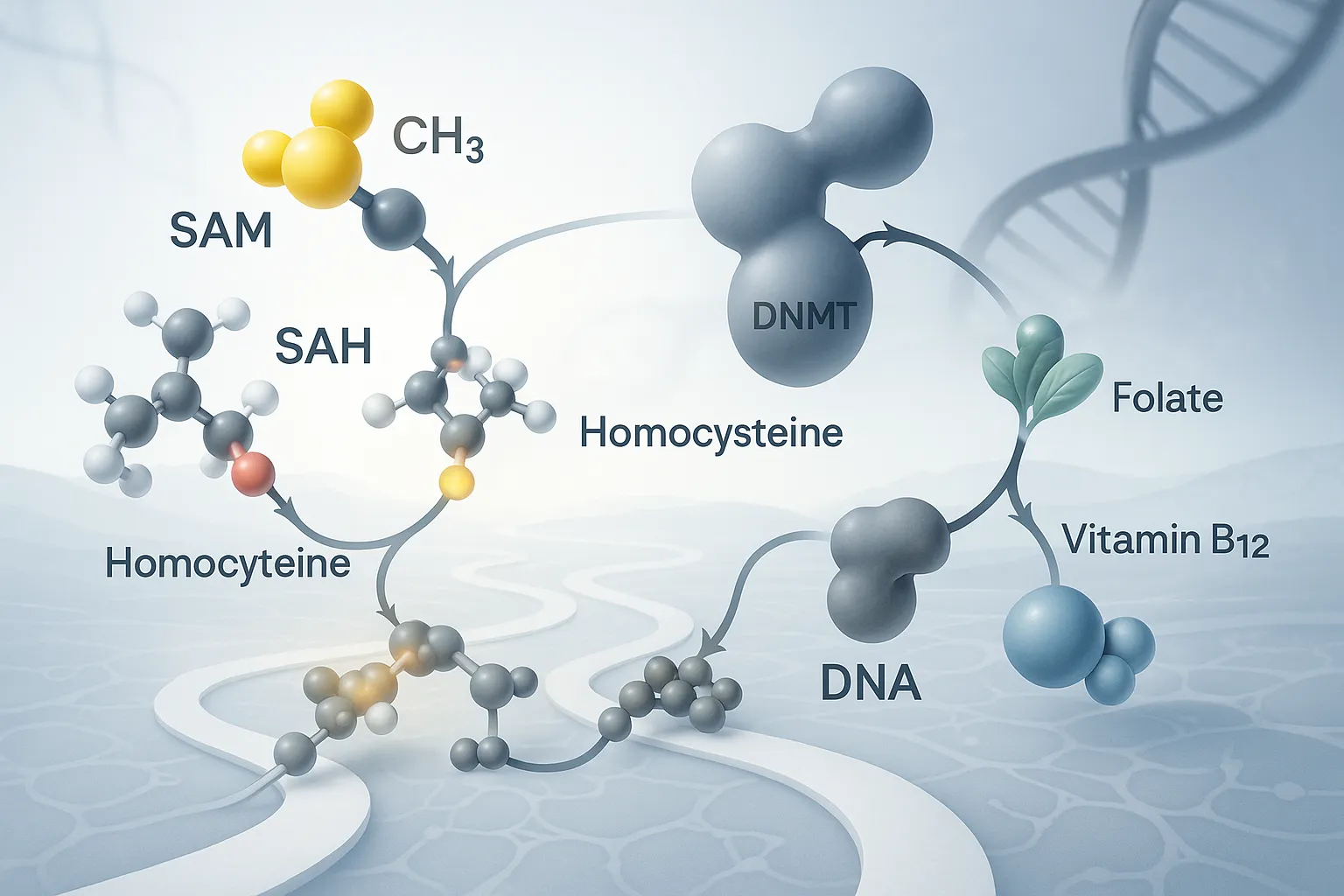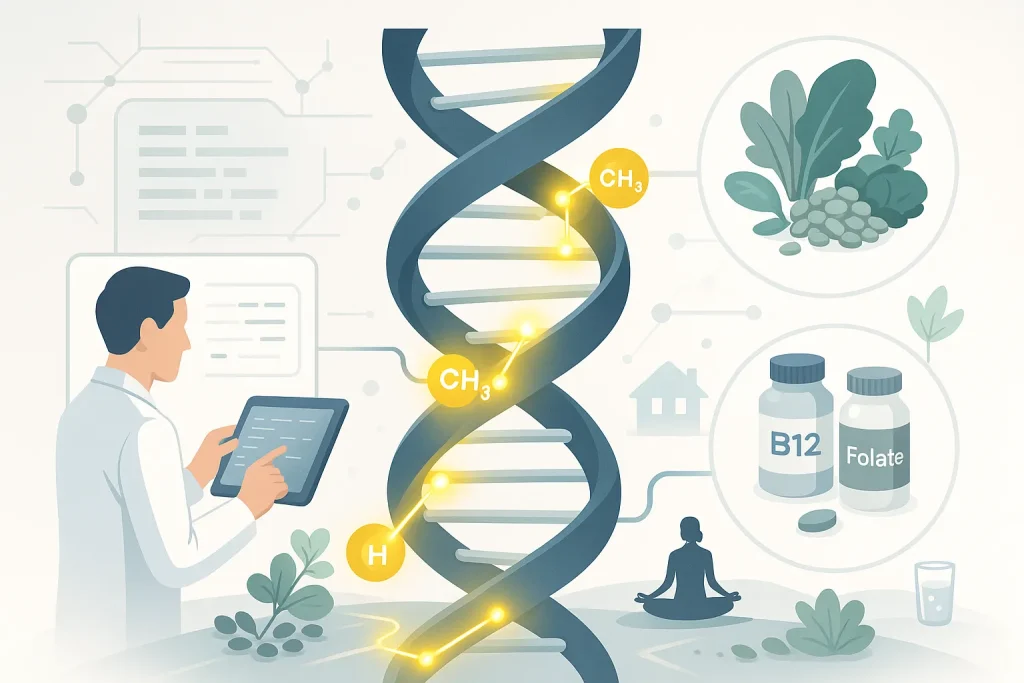
Methylation pathways are vital biochemical processes that affect everything from DNA repair to detoxification in our bodies. At Elite Gene Labs, we highlight the significance of these pathways to enhance overall health and well-being. This blog will dive into what methylation entails, its importance, and how functional lab testing can identify and address potential problems within these pathways.
Table of Contents
What is Methylation?
Methylation is a biochemical process that leads to the transfer of a methyl group (comprising one carbon and three hydrogen atoms) to various molecules, such as DNA, proteins, and other compounds. This process is fundamental for several bodily functions, including:
– DNA Repair and Synthesis: Methylation ensures the stability and integrity of our genetic material by aiding in DNA repair and replication.
– Detoxification: It helps eliminate harmful substances, including heavy metals and environmental toxins.
– Neurotransmitter Production: Methylation is essential for producing and regulating neurotransmitters, which influence mood, cognitive function, and mental health.
– Immune Function: Effective methylation supports a robust immune system, stimulating the body to fend off infections and diseases.
– Hormonal Balance: Methylation plays a critical role in the detoxification and clearance of estrogen metabolites, particularly in Phase II liver processes, helping to prevent estrogen dominance and maintain endocrine equilibrium.
Key Components in Methylation Pathways
Several key enzymes and nutrients are crucial in the methylation process. The MTHFR (methylenetetrahydrofolate reductase) gene is among the most researched. The MTHFR enzyme is pivotal in converting folate (vitamin B9) into its active form, necessary for the methylation cycle.
Variants in the MTHFR gene can affect this enzyme’s efficiency, potentially leading to health issues. However, multiple genes and nutrients are involved in proper methylation.
Important nutrients for methylation include:
– Vitamin B12
– Folate (Vitamin B9)
– Vitamin B6
– Betaine (Trimethylglycine)
– Methionine
The Importance of Methylation
Properly functioning methylation pathways are essential for maintaining optimal health. Disruptions or inefficiencies in these pathways can result in various health problems, such as:
– Chronic Fatigue: Poor methylation can lead to low energy levels and chronic fatigue.
– Mental Health Challenges: Inefficient neurotransmitter production due to poor methylation can contribute to anxiety, depression, and other mental health issues.
– Cardiovascular Issues: Abnormal methylation can cause elevated homocysteine levels, increasing the risk of cardiovascular diseases.
-Immune System Dysfunction: Impaired methylation can weaken the immune system, making the body more vulnerable to infections and autoimmune diseases.

Genetic Testing and Methylation
Genetic testing offers valuable insights into your methylation pathways. By analyzing specific genetic markers, we can identify potential issues and suggest personalized interventions.
At Elite Gene Labs, our comprehensive genetic testing services help you understand how your unique genetic makeup influences your methylation process and overall health.
Optimizing Methylation for Better Health
Once we identify any genetic variations affecting your methylation pathways, we can develop a customized plan to optimize these processes. Here are some strategies we might recommend:
– Dietary Adjustments: Incorporating foods rich in B vitamins, such as leafy greens, legumes, and lean proteins, can support healthy methylation.
– Targeted Supplementation: With DNA-based supplementation, methylated folate, methylcobalamin (a form of B12), and other B vitamins may be necessary.
– Lifestyle Modifications: Reducing exposure to environmental toxins, managing stress, and maintaining a healthy lifestyle can enhance methylation efficiency.
Begin Your Journey to Understanding Methylation Pathways
Understanding and optimizing your methylation pathways can significantly improve your overall health and well-being. At Elite Gene Labs, we are dedicated to helping you achieve optimal health through personalized genetic testing and tailored recommendations.
Methylation pathways play a critical role in many essential bodily functions, and disruptions in these pathways can lead to various health issues. By understanding your unique genetic makeup and its impact on your methylation process, you can take proactive steps to support your health. Elite Gene Labs is here to guide you on this journey.
PS: Take our quiz to discover how genetic testing can help you optimize your health and well-being!
Frequently Asked Questions
What are methylation pathways and why are they important?
Methylation pathways are biochemical processes in the body where methyl groups are added to molecules like DNA, proteins, and enzymes. These processes are essential for DNA repair, detoxification, neurotransmitter balance, immune regulation, and overall cellular health.
How do I know if I have a methylation issue?
Symptoms of poor methylation may include chronic fatigue, brain fog, anxiety, depression, trouble detoxing, and recurring infections. Genetic testing can reveal whether you have gene variants—such as in the MTHFR gene—that affect your methylation efficiency.
What is the MTHFR gene and how does it impact methylation?
The MTHFR gene helps convert folate (vitamin B9) into its active form, which is critical for proper methylation. Certain variants of this gene can reduce enzyme function, leading to issues like elevated homocysteine levels and impaired detoxification.
Can diet and supplements improve methylation?
Yes. Foods rich in B vitamins (like leafy greens, legumes, and eggs) support methylation. For those with genetic variations, methylated supplements—such as methylfolate and methylcobalamin (active B12)—may be recommended to bypass enzyme deficiencies.
Is methylation testing part of a regular genetic test?
Not always. Most direct-to-consumer DNA tests don’t focus on methylation. Specialized tests, like those offered through Elite Gene Labs, analyze key genes and pathways that influence methylation and provide actionable recommendations.
What health problems are linked to poor methylation?
Disrupted methylation pathways have been associated with cardiovascular disease, mood disorders, chronic fatigue, autoimmune conditions, and neurodegenerative diseases due to impaired detoxification, inflammation control, and neurotransmitter production.
Can lifestyle changes affect methylation pathways?
Absolutely. Reducing alcohol and toxin exposure, managing stress, getting quality sleep, and regular exercise can all support healthy methylation alongside dietary and supplement strategies.
Is it safe to take methylation supplements without testing?
It’s not recommended. Taking methylated nutrients without knowing your genetic makeup can sometimes cause side effects. Genetic testing helps determine the right type and dosage for your individual needs.

